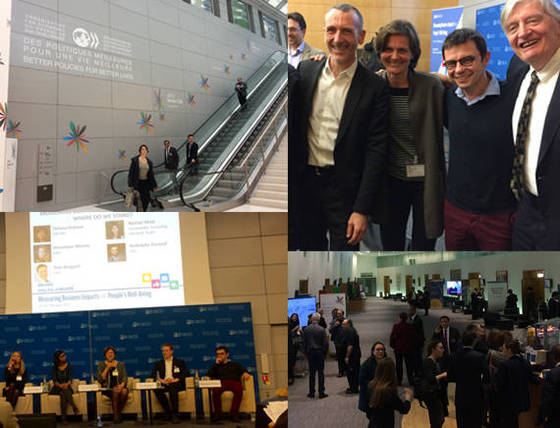Measuring Business Impact on Well-being: Utopia or the Only Way to Survive?
How can the business community measure work’s impact on our well-being? The question was at the heart of a major two-day workshop co-organized by the OECD, HEC Paris and Fordham University, culminating on February 24. It was attended by leading researchers and representatives from the business, NGO, higher education and public policy sectors. They flew in to Paris from the five continents to fuel lively debates over work and well-being, hoping the outcome could, in the words of a keynote speaker, “dictate a new narrative for the 21st century”. “At stake,” said HEC Paris professor emeritus Georges Blanc, “is probably the future of the enterprise as a social and economic institution.”

Looking Beyond Facts and Figures
The statistics are stark: 87% of employees worldwide do not feel engaged to their work. In the United States alone, 12.6% of the workforce are actually actively disengaged. And, according to a Gallup study in 2013, their lethargy costs the country $450 billion to $550 billion in lost productivity each year. “Yet major business companies are still taking us in the wrong direction,” hammered Chris Laszlo, co-founder of Sustainable Value Partners LLC, addressing the packed auditorium of the OECD Conference Center. “They’re slowing down, but it’s still the wrong direction. And we need to change that.”
Giant Leap Forward
This call for companies to look beyond their balance sheets was echoed throughout last week's OECD Workshop which was co-sponsored by HEC’s SnO Center. “When I meet corporate leaders and tell them what we are doing to change business mentality, I never see them looking at their smartphones in boredom,” noted Jacques Berger, director of the Action Tank Entreprise et Pauvreté. “There is a huge appetite to bring back purpose in company practice,” he added, underlining the word “purpose”. “CEOs want to believe in something else than what they are seeing in their companies.”The business strategist insisted he is optimistic: “What we are doing at the Action Tank - working exclusively with multinationals - would have been inconceivable in 2005. Corporate leaders are more and more open-minded to innovation. Sure,” he pursued in front of an audience of almost 200 people, “many employees in these big companies think what we are doing is madness – you know, creating a more inclusive capitalism and influencing public policy by being ‘embedded'. Some want to shoot us when, for example, we suggest Renault carmakers price products with marginal profit. But we have to take these companies out of their comfort zone, back to the time when financial returns were a measure of efficiency and not the goal, per se.”
Seeking Out New Measurement Tools
The plethora of different standards have helped muddy the waters. Professor Emeritus of Strategic Management at HEC Paris Georges Blanc delineated the major objective of the OECD gathering: “It's necessary to take stock of the different well-being measurement systems in use within companies, like CSR, ESG, GRI, and see how they can be harmonized, broadened, completed and better used.” At the outcome of the event, Georges Blanc insisted participants at the workshop are in the process of building an action plan to answer “this huge and urgent challenge.”
Exploiting Hard Data for Well-being
This urgency has not escaped the attention of the SnO Center and its Academic Director Rodolphe Durand mapped out pragmatic approaches to changing ways of measuring well-being in business. The cofounder of HEC's SnO Center outlined the work his team have been conducting to help some of France's leading multinationals to better evaluate their impact on well-being. “These are difficult but exciting times,” said Rodolphe Durand, “because there is so much data available. Hard data evidence, coupled with a business sector guided by strong moralistic principles and advanced education programs engineered by business schools, will allow us to create a common tool to measure well-being in the workplace. This is a time,” he concluded, “for convergence. We are hopeful we can build a new narrative that is evidence-based.”
New Landmark Legislation in France
But perhaps this new narrative is already emerging in France. Fellow-academic at the SnO Center, Frédéric Dalsace, reminded participants of draft legislation passed last year by the French National Assembly, describing it as an “incredible” measure. The November 29 law (http://corporatejustice.org/news/393-france-adopts-corporate-duty-of-vi… ) requires French companies employing over 5,000 employees to implement a “duty of vigilance” to identify risks to human rights and the environment caused by their activities. “These measures focus on the supply chain (wages, work conditions, gender, etc). We are hoping this historic step will next be applied at a European level,” he declared.
Surprise Climax to Workshop
One of France's leading CEO's has not waited for a new law to improve well-being in his company. And he turned out as the surprise guest to end the 14-hour workshop. “The well-being question is a critical one,” declared Emmanuel Faber, who has been running Danone since October 2014. He then outlined the crucial nature of accurate social indicators in corporate decision-making “at all levels”. “There is an increasing need for consistency,” the CEO insisted. “And for this, we need a common language when talking about long-term goals. In order to change the paradigm we need to create alliances that don't exist nowadays because this common language has yet to be created.”In his call for a “new vision for society”, Emmanuel Faber made a resounding plea to support business schools. “To redefine the software we need to inspire ourselves from the example set in the past by the US when Wall Street poured money into Harvard. These schools will make future generations aware that finance is a tool and not an objective. We have to take a financial gamble. We have the right, no, the duty to be Utopian.”